“To Hell With Us” – Records of Misconduct Found Inside Pa. Drinking Water Investigations
Since 2004, when the controversial process known as “fracking” began in Pennsylvania, over 4,100 drinking water complaints related to oil and gas operations have been reported to the Pennsylvania Department of Environmental Protection (DEP).
But as Public Herald reported in January, DEP has determined that a shocking 93% of these water complaints are not related to oil and gas activity.
The discrepancy between the number of complaints and the Department’s confirmed cases begs the question – Why is DEP saying oil and gas isn’t to blame for so many complaints?
DEP has not responded to Public Herald’s questions about this discrepancy.
A number of speculative reasons have been offered by the industry, academics, and are parroted by mainstream media: farming chemicals, road salt, and the lack of private water well regulations. However, these factors have been present since before 2004 and therefore do not explain the rise in citizen complaints.
What’s new is fracking, a technology that requires massive quantities of trade-secret chemical solutions pumped underground with intense pressure to break apart bedrock and release fossil fuels and naturally occurring radioactive material (NORM). And in January 2017, Public Herald found that citizen complaints have increased alongside unconventional fracking wells since 2004.
Could there be another explanation for DEP’s 93% discrepancy?
Since 2011, Public Herald has accumulated evidence that the Department either fails to follow the law or cannot properly address water contamination when it occurs.
After reviewing DEP complaint investigations, we found the Department violated Title 58, Section § 3218 of Pennsylvania’s Oil & Gas Law, which mandates the “Protection of Water Supplies.”
In 178 cases, the Department’s actions can be characterized under three types* of official misconduct – malfeasance (breaking the law), misfeasance (wrongful actions) and negligence (careless behavior).
For this investigation, our team analyzed 1,000 of DEP’s 4,108 drinking water complaints. The 178 cases of misconduct are available for public review in this online spreadsheet, which includes the names of the DEP inspectors and supervisors responsible for each case.
Imagine that you have a private water supply, and, one day after a nearby fracking operation, your water turns brown…or black…purple…bubbly…or foamy.
You call the Department of Environmental Protection, who is required by section 3218 of the oil and gas law to document your complaint and investigate “within ten days.” At that point, the law states “the department shall…make a determination within 45 days.”
If DEP determines your water supply is in fact impacted by nearby oil and gas operations, you become one of the 7% of complainants who receive a “positive determination.” The Department is then supposed to send you a determination letter.
This letter is made public and added to an online list documenting “cases where DEP determined that a private water supply was impacted by oil and gas activities…both conventional and unconventional…”
If DEP determines your water supply was not impacted by oil and gas operations, the Department closes your complaint with a non-impact determination letter.
Over the past five years, Public Herald has interviewed hundreds of families who have had similar experiences with DEP. In Angela Smith’s story, several problems with the way DEP handles water complaints are highlighted.
In some cases, it is clear that DEP staff find problems with drinking water, but can’t link it to nearby oil and gas operations. But in far too many cases, DEP finds evidence and then ignores it, refuses to investigate, or engages in other forms of official misconduct.
- DEP failed to resolve 41% of 4,108 drinking water complaints within 45 days as required by law. In a response to Public Herald’s first report, DEP spokesperson Neil Shader reported to StateImpact PA that “the majority of complaints are responded to and resolved quickly.” While this is technically correct, his statement is deceptive and fails to acknowledge that over 1,600 residents had to wait months or years longer for DEP’s determination.
- The DEP inspector fails to investigate. Inspectors create excuses — cite past investigations by the Department, distances from gas wells, or background conditions — as reasons to not investigate. However, the law mandates that “the department shall investigate the [complaint].” Cases of DEP staff refusing to sample include: #300702, #310102, #296204, #292997, #301927, #276365, #303243, & #306597.
- The DEP inspector finds evidence that water has been impacted, but makes a non-impact determination. Despite initial evidence of water impacts from oil and gas activities, the Department continues the investigation, often sampling past the 45 days permitted by law. Then, as soon as a sample shows a relative improvement in water quality, DEP issues a “non-impact” determination. Examples include #274235, #257584, #265864, #232327. These “non-impact” conclusions mean that there was never an impact from oil and gas activities. However, what the inspector is supposed to do is issue a “temporary impact letter.” Here are some examples from the Department’s list of temporarily impacted water supplies: #275992, #274997, #269945.
In 2014, Pennsylvania Auditor General Eugene DePasquale released a performance audit of DEP outlining several problems with how the Department handles its water contamination investigations. One of the Auditor General’s findings concerned determination letters:
“Water quality investigations that continue for months without a determination are inconsistent with statutory and regulatory provisions and are a serious impediment to complainants’ quality of life…DEP should ensure that clear and understandable ‘determination letters’ are always issued to complainants in water supply investigations and in a manner that does not allow for misinterpretation.”
In their response to the Auditor General, DEP acknowledged the importance of mailing determination letters to residents. DEP claimed that there were only a “few instances” when determination letters were not sent and that “these isolated instances are not indicative of the Oil and Gas program.”
After a closer look, DEP’s claim that they rarely fail to send determination letters is deceptive.
Between February 2007 and October 2012, DEP resolved 1,978 complaints but only provided 973 letters to Scranton Times-Tribune for the newspaper’s Right-to-Know (RTK). This means over 1,000 determination letters were unaccounted for during that time period. Either the letters didn’t exist, or DEP failed to provide them for the Right-to-Know.
During Public Herald’s file reviews in 2016, the staff at the DEP Southwest Regional Office could only produce a small number of determination letters for 1,167 water complaint investigations.
Based on the problems we experienced and the available data, failing to send determination letters is not isolated to a “few instances,” and families have been robbed of information about their drinking water.
When a DEP inspector investigates a water supply complaint, they are supposed to do so using scientific methods. Bill Cosmer, a professional geologist at DEP, explained to resident Christine Pepper during her complaint about what a comprehensive investigation looks like:
But, in some complaints, DEP staff failed to thoroughly investigate. This is evident both in the complaint records and first hand accounts from residents with investigations.
- DEP fails to conduct comprehensive water sampling: Because fracking involves a host of chemicals, a reasonable, scientific approach would include testing for volatile organic compounds (VOCs) and BTEX (benzene, toluene, xylene, ethylbenzene) according to Duquesne University’s Dr. John Stolz, who has conducted extensive water testing related to fracking. Examples include #302947, #280927, #269441, #288420.
In the following video, DEP inspectors visit a complainant’s home but choose not to sample the water. Instead, inspectors check for methane gas but explain that such a reading doesn’t show dissolved methane in the water. In other cases DEP did not find combustible gas in the ‘glass trick’ as seen in the video, but detected it in the water sample sent to a laboratory. (Video: Case #313290)
In this video by journalist Julie Dermansky, a DEP inspector explains that he samples for whatever seems right at the time, rather than doing a comprehensive set of testing.
- DEP claims oil and gas is not responsible based on scientifically arbitrary distance — this a misuse of the “presumption of liability” clause of Section § 3218. This clause states that if a water supply is within 1,000 or 2,500 feet of a gas well, the operator is presumed responsible. Nowhere in the law does it say that contamination should be dismissed based on this distance. However, DEP inspectors have refused to sample or made non-impact determinations for complaints based on the fact that residents live outside this arbitrary ‘zone of presumption.’ Examples include: #250516, #281087, #300702.
- The Department does not provide sufficient evidence for their non-impact determination. DEP inspectors sample drinking water, find elevated compounds typical of oil and gas impact, but make a non-impact determination. Often, they provide no explanation, other times they explain away the results, stating that contaminants are related to “background conditions,” without providing any evidence. Examples include: #286101, #273912, #226074, #269114, #286492, #285757, #281364.
The Department is not operating with full transparency. Our investigation has found that DEP fails to disclose all water contamination impacts to the public and chooses to apply the bare minimum effort required by law.
- DEP shreds “non-impact” complaint records after five years, according to the Department’s “special handling” retention policy and does not create a backup (PDF, microfiche) of records. Other files at the Department are kept for up to 100 years.
- DEP does not sample or send a determination letter for pipeline related water complaints. DEP inspectors state that pipelines are not covered in Section 3218, using it as an excuse not to use the degree of care they would in other water complaint cases. #281744, #293769, #271387.
- DEP does not list all positive determinations on their website. Public Herald has found 49 cases of water supply contamination related to oil and gas activities that have been confirmed by DEP, but not listed on their website. DEP failed to produce 18 of these 49 cases for Public Herald’s record requests.
The Department has disclosed that 284 private water supplies have been impacted by “both conventional and unconventional drilling activities.” DEP also states that the list is “intended to identify historic water supply impacts.” Their description gives the impression that all confirmed cases are included in this list. But this is not true.
If DEP included the additional 49 cases of confirmed impact, that would increase the total number to at least 333. But as clearly demonstrated by this report, even that is far from the total number of drinking water supplies impacted by oil and gas operations across the state.
While the evidence of DEP’s misconduct may invoke feelings of futility, it’s important that citizens who experience problems continue reporting them to the state. Citizen complaints are invaluable for tracking potential impacts over time.
According to Dr. John Stolz of Duquesne University, even if you feel you can’t trust the Department, you still need to ‘call in the complaint…and test the system.’
If unsatisfied with DEP’s determination, residents have 30 days to appeal. This is another reason it’s so important that DEP send determination letters.
According to attorney John Smith, who has litigated on behalf of several residents with water contamination in Pennsylvania, “If DEP never sends the determination letter, the resident has no written proof of when the 30-day clock starts.”
The inspectors and supervisors who handle complaint cases do so under the leadership of their regional directors, Oil & Gas Deputy Secretary Scott Perry, and DEP’s Acting Secretary Patrick McDonnell. When faced with criticism in the past, DEP spokespeople like Perry and Neil Shader have consistently told the press and public that staff and budgetary constraints prevent the Department from doing its job.
While budgetary constraints may be an excuse for failing to improve information technology or inspect every one of the 10,000 unconventional wells throughout the state, our complaint review has found no evidence suggesting that budgetary shortfalls are to blame for ignoring and abusing the law.
Whatever the reasons for DEP’s misconduct, the consequences are far too real for families who lose their drinking water, their home, or their health.
Instead, state officials insist that fracking is safe for Pennsylvanians. Governor Wolf is once again calling for a severance tax, which might help fill the hole in DEP’s budget. But a tax won’t address the cultural problems at DEP, or the mishandling of complaints at the expense of people’s water and well-being.
When the citizens of Flint, Michigan noticed problems with their water and health, they called their local and state officials for help. However, these concerns were brushed aside, ignored, or downplayed.
But when the truth came out about the Flint water crisis, Michigan Attorney General Bob Schuette, quickly and firmly brought criminal charges against the officials responsible.
“The victims are real people, families who have been lied to by government officials and been treated as expendable,” Schuette states on his website.
“But when our investigation is completed and our prosecutions are successful—and we believe they will be—then accountability and justice will be delivered to families of Flint.”
Among those charged with felony and misdemeanor crimes in the Flint water crisis were several current and former staff of the state’s Department of Environmental Quality, Michigan’s equivalent of DEP. One of these officials is the former Chief of the Office of Drinking Water & Municipal Assistance, Liane Shekter-Smith, who was responsible for properly addressing citizen complaints:
DEP is not an amorphous public agency without accountable parties – it has a body of administrators, regional directors, oil and gas program managers, inspectors, and supervisors who are responsible for decisions that affect the public’s well-being.
The Department also operates under the leadership of Governor Tom Wolf and the laws set forth by the Pennsylvania Legislature.
In January, Public Herald asked the office of Pennsylvania’s new Attorney General, Josh Shapiro, whether he has the jurisdiction to hold specific public officials accountable for actions in the same way Attorney General Schuette did in Michigan.
Director of Communications Joe Grace replied via email that, “By law, the Office of Attorney General has authority to investigate state officials or employees for criminal conduct affecting the performance of their public duties, whether the matter involves the environment or any other issue.”
Attorney General Shapiro campaigned on the promise to hold the oil and gas industry accountable for impacts in Pennsylvania.
But when it comes to investigating potential polluters, Shapiro only has limited jurisdiction. Grace wrote:
“The Office of Attorney General’s jurisdiction is governed by the Commonwealth Attorneys Act. By law, OAG can only investigate potential environmental crimes that are referred to it by a District Attorney or a Commonwealth agency, such as the Department of Environmental Protection or the Department of Conservation and Natural Resources. Attorney General Josh Shapiro has made stronger collaboration with district attorneys and Commonwealth agencies such as DEP a priority to protect the people of the Commonwealth.”
At his inaugural address, Shapiro had strong words that might shine a bit of hope into the dark corners of this report:
“Anyone who tries to roll back your rights will have to go through me. I won’t be afraid to stand up to anyone, from the President of the United States to a multinational company, to a drug dealer on the street corner.”
Public Herald will be formally presenting this report and our body of evidence to the Attorney General in the near future.
In the meantime, anyone can submit inquiries to the Office of Attorney General by calling 717.787.3391 or by filling out the contact form here and citing this report https://publicherald.org/fracking-misconduct/.**
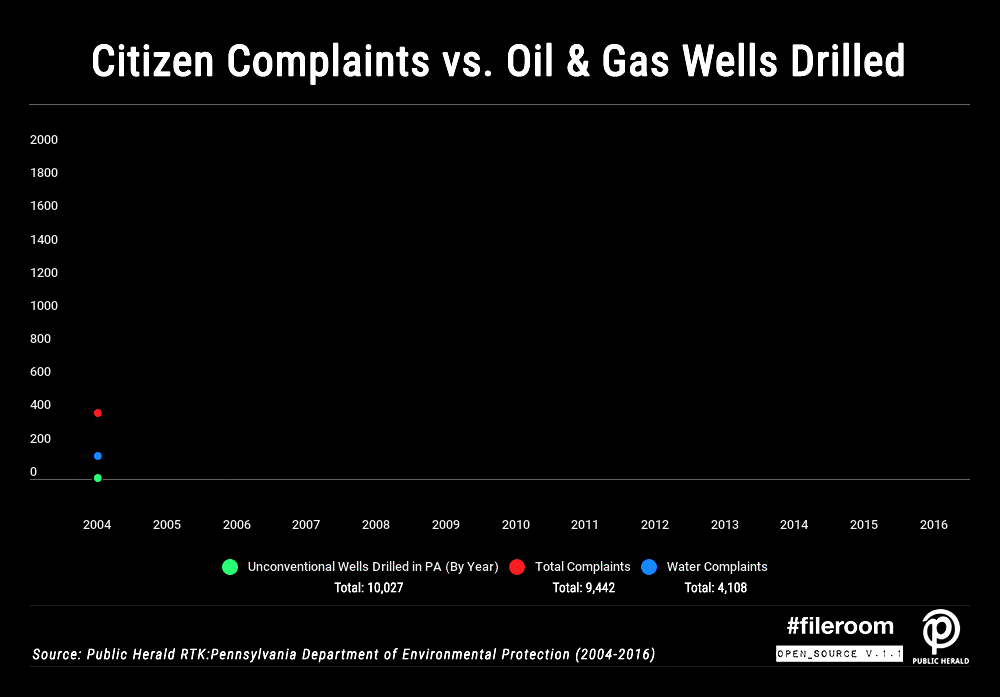
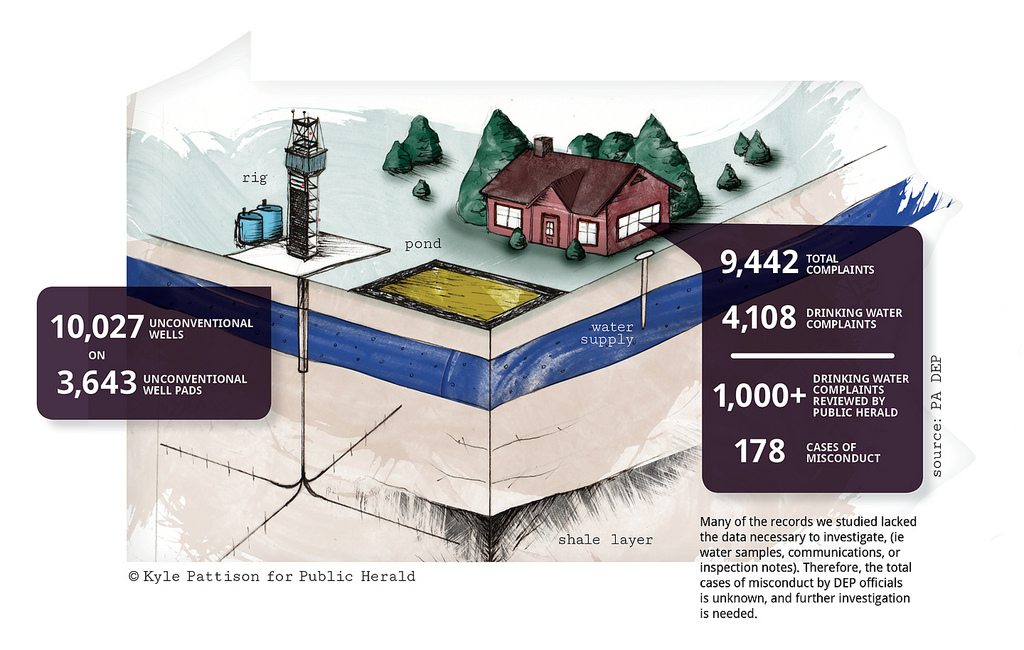
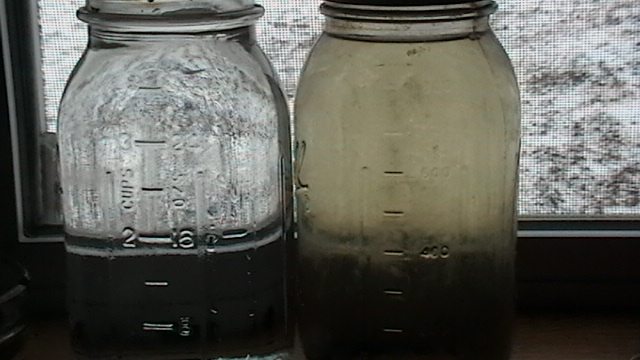
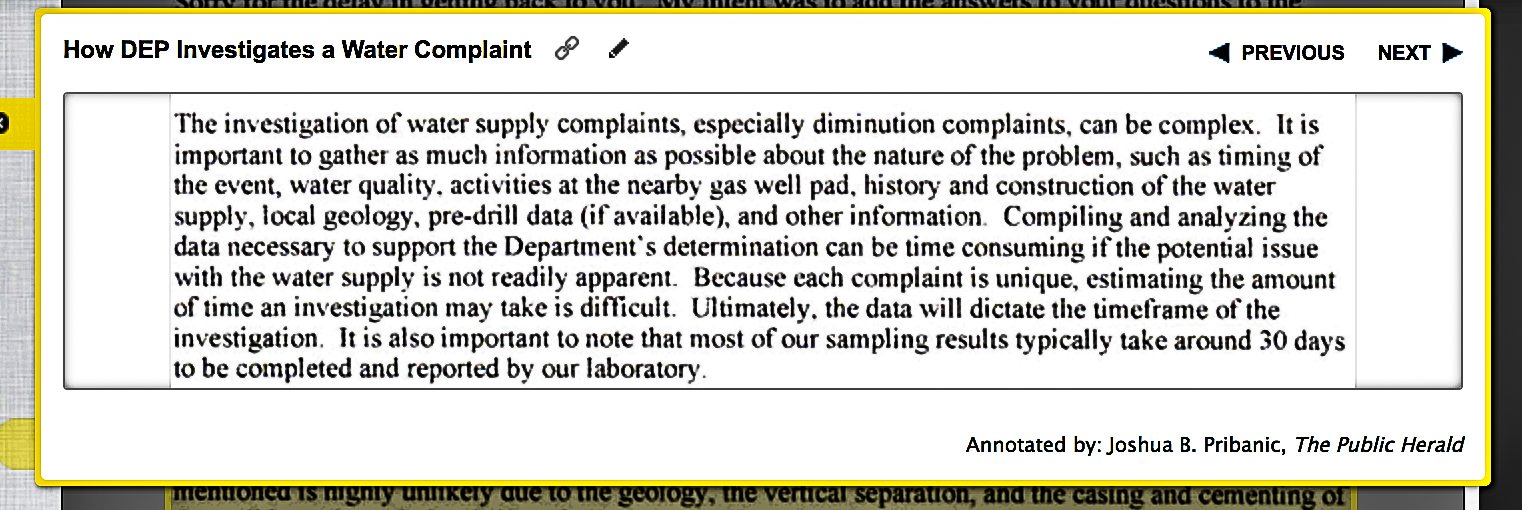
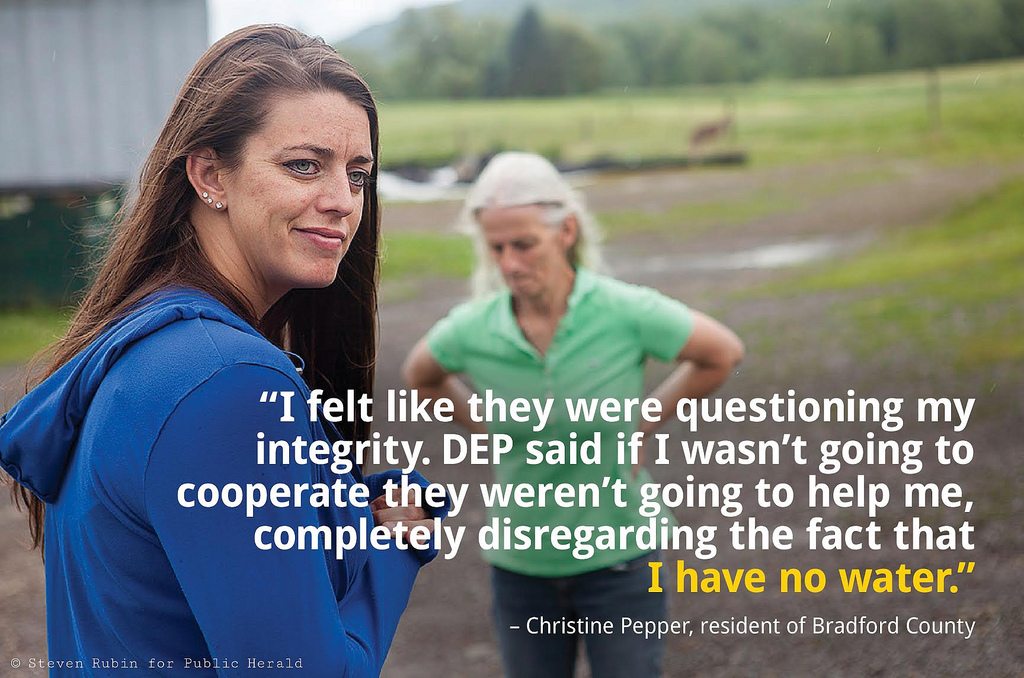
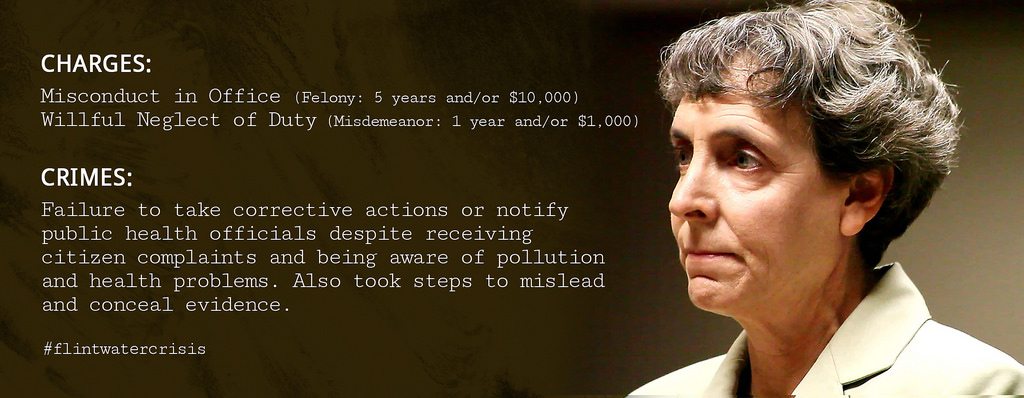













Thank you for this eye opening report. I am hopeful the attorney general, the PA legislators and the Governor will do something to help these families. The contamination of our air, water and democracy by the O&G industry must stop. It’s time for our government to stop promoting this toxic industry and start protecting the people.
We here in Western Maryland thank you for all the work you’ve done. My belief is that if at all possible you should hold a press conference and make this information available to the national media. I have been watching various news agencies to note when people in other states could learn of this. It’s really important to have this information circulated as widely as possible. I’m going to pass it around to those who read my newsletter. Best ever!
Jim
Once again, Public Herald pulls back the veil to display an agency, PA DEP, that has time and again comes up short in its mission to to protect the environment that sustains us all. And now, a word from PA DEP. *silence*
Pennsylvania needs to restore real elections.
This is a vitally important issue which must be addressed to stop the subjugation of Americans by those who despise and exploit them.
Blackbox electronic “voting” is the digital death of democratic representation in government.
The Republicans, Russians and/or who knows who all else just took advantage of an easy opportunity, much as car thieves who can’t resist stealing luxury vehicles left unlocked with keys in their ignitions.
Things which should be known beyond all doubt:
How many eligible electors were removed from the electronic database rolls? Who were they, and who removed them?
For the massive majorities of electors forced to use paperless DREs, ballot opscans, polling precinct communications computers, and central tabulators built by foreigners and owned/operated by private corporations, exactly what hardware, firmware, and software – including backdoors – were involved? Exactly what chain of custody existed, if any, for all devices and removable media used on those devices?
What security measures were implemented, if any, to the modem transmissions of data sent from polling precincts to county elections officials?
If these things can not be known beyond all doubt, the results of any “election” are invalid.
At least paper ballots counted by hand can be observed throughout the process.
Any American who appreciates the ideals on which the USA was originally based would fight to the death for representation in government, as this nation’s founders were willing to do. If this “election” were legit there would be nothing to fear for the status quo, but if not it would signal a clear call for the restoration/implementation of genuine democratic processes in this republic.
Questioning the blackbox is totally appropriate.
The rigged “voting” systems don’t allow for valid recounts or audits.
Too many vital states use completely inappropriate electronic “voting” systems. Florida uses paperless and other suspect equipment in its major population areas. Michigan uses paper ballots but they are “counted” with opscans shown to be subject to tampering. Wisconsin is worse, with some paperless systems even more easily manipulated with no hope of recounts. Pennsylvania is by far one of the worst examples of a state forced into use of a totally paperless DRE-based system allowing for no valid counts or recounts. The Commonwealth of Pennsylvania, as numerous other states, replaced real voting by the use of antiquated Asian mystery hardware/firmware/software accessible by myriad entities including but not limited to felons, rabid partisans, traitors, and foreigners such as Chinese and Russian hackers. There are touchscreens subject to various types of tampering including backdoors and simply applying viscous substances to the screens. Pedro Cortés illegally stopped PA citizens from demanding that the “voting” systems be examined by experts because he knows they’re defective and easy to rig.
People in most states have to wait in long lines to try to use such unreliable machines when using paper would be much faster and more convenient. You can’t expect valid elections when you outsource them rather than making sure they’d involve ballots and counts made in the USA.
In strategic population centers of over 40 states, actual counts of real ballots have been replaced by the use of foreign-built devices owned by unaccountable corporations. These electronic systems are proprietary and of undisclosed design, build, programming, and operation. They are vulnerable to easily-concealed manipulations and known to lose, switch, and fake votes. Even mailed, absentee, and other handwritten ballots are manually fed into hackable opscans, and the central tabulators are particularly problematic. They were unsecured and obsolete when new and that was over a decade ago now. Thus democracy dies via digital disenfranchisement.
Some wonder why more tech savvy young people don’t turn out to vote. Those young people wonder why they try to call it that.
https://www.brennancenter.org/press-release/new-study-voting-machines-risk-ahead-2016-election
https://www.cnet.com/news/hack-the-vote-could-cyberattackers-disrupt-the-election/
http://news.nationalgeographic.com/news/2004/11/1101_041101_election_voting.html
http://electiondefensealliance.org/?q=2007/06/the_case_for_hand_counted_paper_ballots
http://www.thelandesreport.com/votingmachinecompanies.htm
http://www.votersunite.org/takeaction/handcounted.asp
http://www.notablesoftware.com/RMstatement.html
http://www.handcountedpaperballots.org/
http://www.wheresthepaper.org/
A very partial list of computer experts who have pointed out the problems includes, but is not remotely limited to:
Aviel Rubin, PhD, Professor of Computer Science at Johns Hopkins University
Edward Felten, PhD, Deputy U.S. Chief Technology Officer for The White House, formerly Professor of Computer Science at Princeton University
Michael Fischer, PhD, Professor of Computer Science at Yale University
David Dill, PhD, Professor of Computer Science at Stanford University
Rebecca Mercuri, PhD, Computer Security Forensics Consultant, former Fellow, Radcliffe Institute, Harvard University
Douglas Jones, PhD, Professor of Computer Science, University of Iowa
Herbert Thompson, PhD, Adjunct Professor of Computer Science, Columbia University
See also:
http://www.gregpalast.com/election-stolen-heres/
Watch this video for an excellent summary:
https://www.youtube.com/watch?v=w3_0x6oaDmI